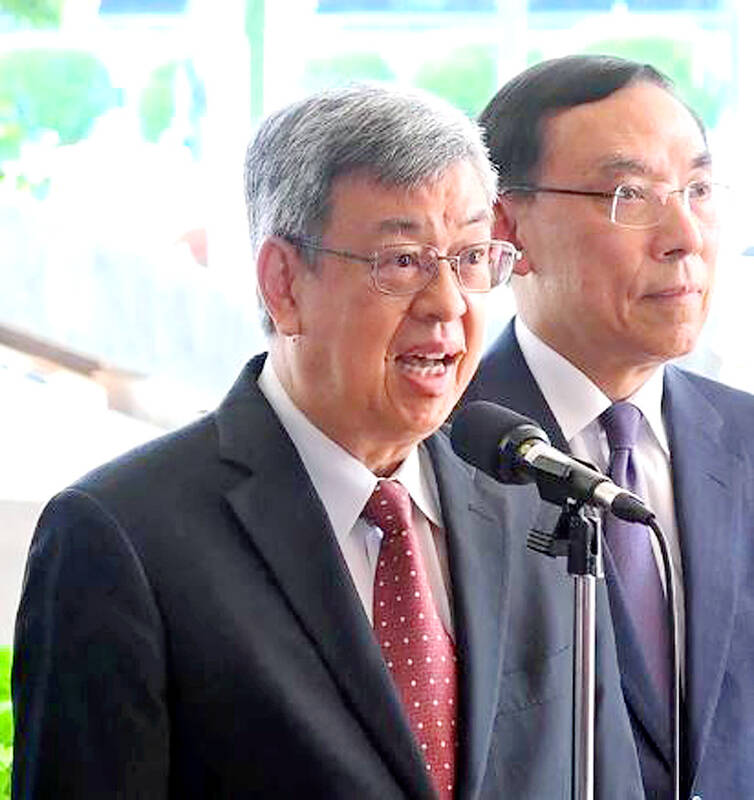The global trend is toward “de-risking” relations with China, Premier Chen Chien-jen (陳建仁) said yesterday, in response to calls by opposition parties to restart talks on a proposed cross-strait service trade agreement.
Previous talks on the proposed pact resulted in “several hundred thousand Taiwanese standing up in protest,” Chen said, referring to the Sunflower movement of 2014.
Today, Taiwan hopes to follow the global trend of de-risking with China, and “not putting all of its eggs in one basket,” he said.

Photo: Screenshot from Liberty Times’ YouTube
De-risking is especially important for Taiwan given US-China tensions, and Taiwan’s desire to boost economic cooperation with other countries, Chen said.
Chen made the remarks after Taiwan People’s Party Chairman Ko Wen-je (柯文哲), who is running for president, raised the proposal at a recent event. New Taipei City Mayor Hou You-yi (侯友宜), who is the Chinese Nationalist Party’s (KMT) candidate, has also expressed support for the proposal.
The proposed agreement, which China and the then-KMT government signed in 2013, aimed to liberalize trade and investment rules between the two economies in service industries including finance, tourism, healthcare, telecoms and publishing.
However, the KMT’s efforts to hastily ratify the pact in the legislature set off a three-week, student-led sit-in protest in the legislature, which led to the agreement being shelved.
Economic Democracy Union convener Lai Chung-chiang (賴中強) said that if the proposed pact were approved, large numbers of Chinese companies would establish local branches in Taiwan, which would likely hire Chinese employees, and would not help local employment.
The goal of any such trade or service agreement would be the complete integration of Taiwan’s economy with China’s, he said.
Chinese agricultural and industrial products would also be dumped on Taiwan, which would greatly harm Taiwanese farmers and manufacturing firms, he said.
“The result of economic integration would be to bring the economic risks of China closer to Taiwan, while forcing Taiwan to remain on its old path of economic dependence on China,” he said.
Vice President William Lai (賴清德), who is the Democratic Progressive Party’s presidential candidate, on Sunday said that those proposing to restart talks on the service trade pact “do not understand current international trends.”
“Taiwan’s current economic and industrial structure is completely different from what it was when the agreement was first discussed 10 years ago,” he said. “To enter into such an agreement today would be very detrimental to Taiwan.”
Asked about the pact, Hou on Sunday said that “both sides of the Taiwan Strait should resume pragmatic exchanges and dialogue on cooperation in education, culture, and in trade and the economy, including through the cross-strait service trade agreement.”
During a radio interview yesterday, Ko said that talks on the agreement should be preceded by supervisory regulations, and that “the trade in goods must precede the trade in services,” because the former would present “fewer problems involving people, and is therefore easier to deal with.”
Additional reporting by Tang Shih-ming, Huang Tzu-yang and CNA

CHAOS: Iranians took to the streets playing celebratory music after reports of Khamenei’s death on Saturday, while mourners also gathered in Tehran yesterday Iranian Supreme Leader Ayatollah Ali Khamenei was killed in a major attack on Iran launched by Israel and the US, throwing the future of the Islamic republic into doubt and raising the risk of regional instability. Iranian state television and the state-run IRNA news agency announced the 86-year-old’s death early yesterday. US President Donald Trump said it gave Iranians their “greatest chance” to “take back” their country. The announcements came after a joint US and Israeli aerial bombardment that targeted Iranian military and governmental sites. Trump said the “heavy and pinpoint bombing” would continue through the week or as long

TRUST: The KMT said it respected the US’ timing and considerations, and hoped it would continue to honor its commitments to helping Taiwan bolster its defenses and deterrence US President Donald Trump is delaying a multibillion-dollar arms sale to Taiwan to ensure his visit to Beijing is successful, a New York Times report said. The weapons sales package has stalled in the US Department of State, the report said, citing US officials it did not identify. The White House has told agencies not to push forward ahead of Trump’s meeting with Chinese President Xi Jinping (習近平), it said. The two last month held a phone call to discuss trade and geopolitical flashpoints ahead of the summit. Xi raised the Taiwan issue and urged the US to handle arms sales to

State-run CPC Corp, Taiwan (CPC, 台灣中油) yesterday said that it had confirmed on Saturday night with its liquefied natural gas (LNG) and crude oil suppliers that shipments are proceeding as scheduled and that domestic supplies remain unaffected. The CPC yesterday announced the gasoline and diesel prices will rise by NT$0.2 and NT$0.4 per liter, respectively, starting Monday, citing Middle East tensions and blizzards in the eastern United States. CPC also iterated it has been reducing the proportion of crude oil imports from the Middle East and diversifying its supply sources in the past few years in response to geopolitical risks, expanding

Pro-democracy media tycoon Jimmy Lai’s (黎智英) fraud conviction and prison sentence were yesterday overturned by a Hong Kong court, in a surprise legal decision that comes soon after Lai was jailed for 20 years on a separate national security charge. Judges Jeremy Poon (潘兆初), Anthea Pang (彭寶琴) and Derek Pang (彭偉昌) said in the judgement that they allowed the appeal from Lai, and another defendant in the case, to proceed, as a lower court judge had “erred.” “The Court of Appeal gave them leave to appeal against their conviction, allowed their appeals, quashed the convictions and set aside the sentences,” the judges